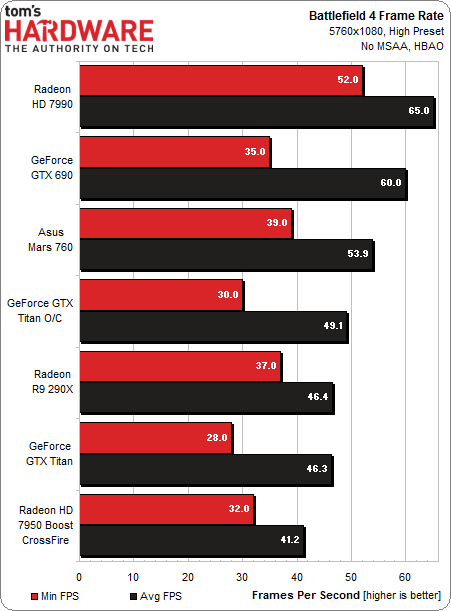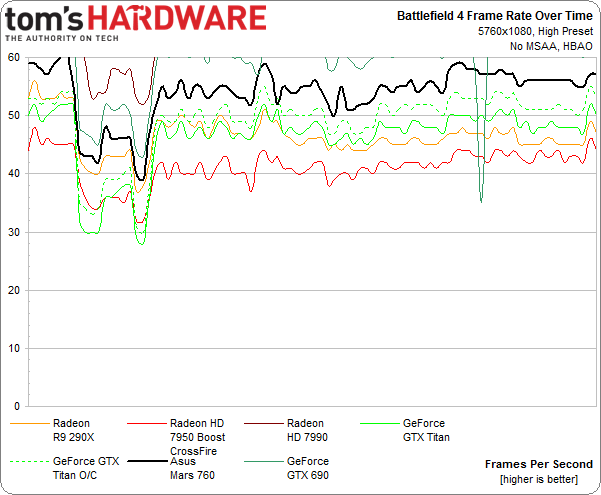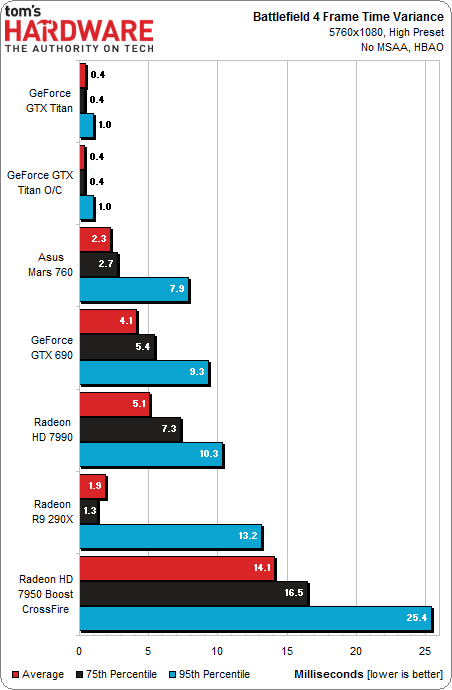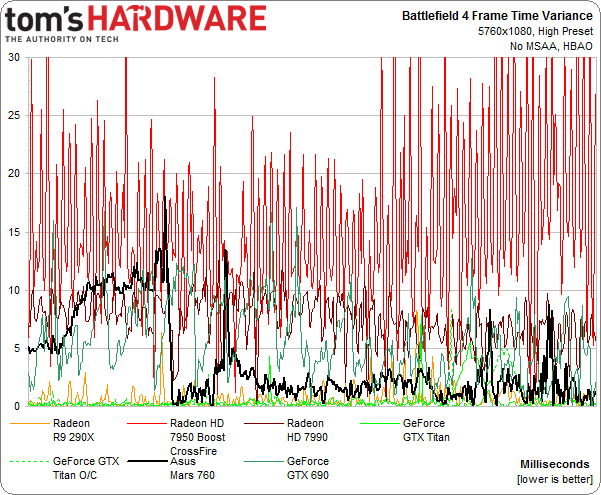Asus Mars 760 Review: Two GPUs In SLI; One $650 Graphics Card
We like the idea of two GK104 GPUs in SLI on one graphics card. Sounds like a GeForce GTX 690, right? Except that board costs $1000 and Asus' Mars 760 sells for $650. In a world with sub-$700 GeForce GTX 780 Tis, can this dual-GPU stunner still impress?
Results: Battlefield 4, 5760x1080
Now we move on to the triple-monitor results using three 1920x1080 FHD displays, totaling 5760x1080. Keep in mind that, from this point on, AMD's frame pacing feature does not work. The company is purportedly on the verge of releasing its Catalyst 14.1 package, but it wasn't able to preview it to us for this story, and as of this writing, the software is still not available for download.
Once it is available, you should be able to switch on frame pacing at resolutions in excess of 2560x1600 and in Eyefinity, which will affect the Radeon HD 7990 and two Radeon HD 7950s in CrossFire.
Of course, because we didn't have a version of FCAT that was compatible with Battlefield 4, the frame rates for those two Radeon-based setups are going to be optimistic. The frame time variance figures should be right, though.
We had to drop the detail preset to High in order to get these graphics solutions cranking out playable performance. Even still, some of the minimum frame rates are flirting with our 30 FPS target.
Asus' Mars 760 does really well though, holding its own against the $1000 GeForce GTX 690.
Two Radeon HD 7950s in CrossFire make this chart look particularly painful, though none of the multi-GPU setups yield appealing frame time variance results in Battlefield 4.
Get Tom's Hardware's best news and in-depth reviews, straight to your inbox.
Current page: Results: Battlefield 4, 5760x1080
Prev Page Results: Grid 2, 2560x1440 Next Page Results: Assassin's Creed IV, 5760x1080Don Woligroski was a former senior hardware editor for Tom's Hardware. He has covered a wide range of PC hardware topics, including CPUs, GPUs, system building, and emerging technologies.
-
vinhn @AMD Radeon, everyone would like to see it, not everyone would buy it, the market knows that, there's a reason why they would rather release the dual 760 rather than a 1600$ dual 780 Ti.Reply -
vertexx I'm not sure why you would even publish this review without a 780ti in the comparison.Reply -
Shneiky It was actually disappointing that there was no regular 760 SLI in there. It would have helped to see if the Asus's solution gives better results then regular 2 760s.Reply -
bemused_fred Looking at the way that various card configurations bounce around in the charts, with the ranking of cards varying from page to page, the only thing I'm taking away from this article is not to bother with dual-GPU set-ups. It seems their performance is entirely decided by how well-optimised the games are for Nvidia or AMD, and not their actual specs.Reply -
Adroid I'm confused why the 780 and 770 aren't shown here - especially since the 780 is at the same price point.Reply -
Au_equus without the gtx 780 ti, you are missing half the article, as ASUS, according to the price, was presenting this card as an alternative to the 780 ti at its price/performance. I stopped reading after the first BM.Reply



